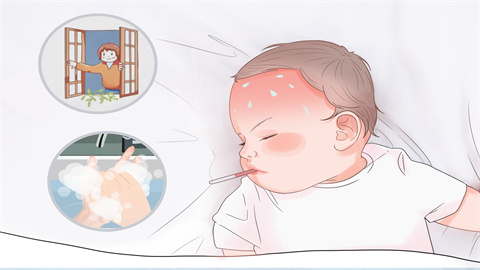What should I do if an 11-month-old baby has a fever of 38.5°C?
Generally speaking, fever refers to elevated body temperature. A body temperature of 38.5°C in an 11-month-old infant may be caused by underdeveloped thermoregulatory center, dietary factors, upper respiratory tract infection, pneumonia, meningitis, or other reasons. Treatment options include general management and medication therapy, under a doctor's guidance. Detailed explanations are as follows:

1. Underdeveloped Thermoregulatory Center
The thermoregulatory center in 11-month-old infants has not fully matured, resulting in weaker temperature regulation ability. Body temperature may fluctuate easily when affected by external environmental factors, leading to fever. It is important to maintain a suitable indoor temperature and avoid exposing the infant to excessively hot or cold environments.
2. Poor Diet
Consuming excessive amounts of food or eating high-calorie, high-protein foods may cause increased body heat production during digestion, leading to elevated body temperature. Additionally, gastrointestinal digestion and absorption after eating can also increase body heat production. It is recommended to properly manage the infant's diet, avoid overeating, choose light and easily digestible foods, and avoid excessive intake of high-calorie, high-protein foods.
3. Upper Respiratory Tract Infection
Upper respiratory tract infection occurs when viruses such as influenza virus or rhinovirus infect the respiratory mucosa, causing inflammation. Under the stimulation of inflammation, the thermoregulatory center may become disrupted, possibly leading to fever. Symptoms such as cough and runny nose may also accompany the fever. Medications such as ribavirin granules, ibuprofen suspension, and pediatric cough syrup may be used under a doctor's guidance.
4. Pneumonia
Pneumonia is caused by bacterial or viral infection of lung tissue. Pathogens multiply extensively in the lung tissue, triggering an inflammatory response that may lead to impaired gas exchange and cause fever. Symptoms such as cough with sputum production and rapid breathing may also be present. Patients may follow medical advice to use medications such as cefixime granules, dextromethorphan hydrobromide syrup, and azithromycin dry suspension.
5. Meningitis
Meningitis is mainly caused by pathogens such as viruses, bacteria, or fungi entering the meninges through bloodstream infection, direct spread, or retrograde infection, triggering meningeal inflammation, which may lead to increased intracranial pressure and fever. Patients may also experience symptoms such as headache and vomiting. Patients may follow a doctor's recommendation to use medications such as ceftriaxone sodium for injection, cefotaxime sodium for injection, and amoxicillin clavulanate potassium tablets.
Maintain good indoor air circulation by regularly opening windows for ventilation. Pay attention to the infant's personal hygiene, encourage frequent hand washing, and avoid contact with infection sources.






